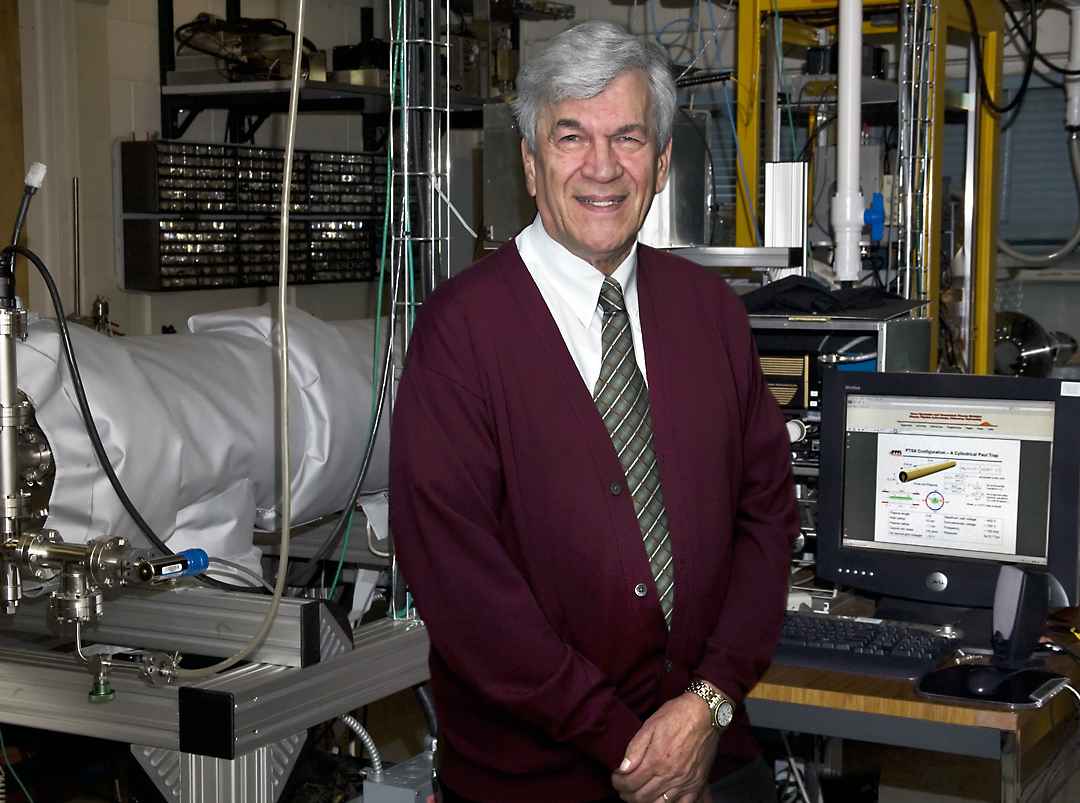
For Immediate Release
July 15, 2008
PPPL's Ronald C. Davidson to Receive Maxwell Prize

For Immediate Release PPPL's Ronald C. Davidson to Receive Maxwell Prize |
|
Plainsboro, New Jersey — Ronald C. Davidson, a professor at Princeton University and a physicist at the U.S. Department of Energy's Princeton Plasma Physics Laboratory (PPPL), is the 2008 recipient of the American Physical Society's James Clerk Maxwell Prize for Plasma Physics. The prize recognizes Davidson for his outstanding contributions to the field of plasma physics. He will receive it at the American Physical Society-Division of Plasma Physics (APS-DPP) annual meeting in Dallas this November.
|
 |
|
Davidson is being recognized for work relating to nonneutral plasmas and the behavior of charged particles making up intense beams, including the collective nonlinear interactions among the particles. Plasma is the fourth state of matter — a hot, ionized gas that serves as the fuel for nuclear fusion. A nonneutral plasma is a many-body collection of charged particles in which there isn't overall charge neutrality, with many applications such as improved atomic clocks and free electron lasers. Intense charged beams have applications in several areas of science and technology, including particle physics and nuclear physics, ion-beam-driven heavy ion fusion, high energy density physics, and proton beams used in cancer therapy. PPPL Director Rob Goldston said, "Ron Davidson is a prodigiously productive scientist. His work, and the work of his group, has defined the field of non-neutral plasmas, including the intense beams that are effectively very-fast-moving plasmas of this type. In parallel with this he has found time to contribute strongly to the leadership of PPPL's Theory Department, and working with the National Academy, to lead a group that has provided the fundamental road map for the future of high-energy-density plasma physics. Ron's successful and broad scientific career makes him more than deserving of this highest award in plasma physics." Davidson is a professor of Astrophysical Sciences at Princeton University and Deputy Head of PPPL's Theory Department and Head of the Laboratory's Beam Dynamics and Nonneutral Plasma Division. He is also Deputy Director of the Virtual National Laboratory for Heavy Ion Fusion Science, a collaborative effort among PPPL, Lawrence Berkeley National Laboratory, and Lawrence Livermore National Laboratory. He has been the Editor of the journal, Physics of Plasmas, since 1991. Davidson's colleagues lauded his achievements in plasma physics. "Ron is arguably the most significant and recognizable leader and champion of plasma physics alive today," said Tom Katsouleas, Professor and Dean at Duke University Pratt School of Engineering. Added Amitava Bhattacharjee, Paul Professor of Space Science and Physics at the University of New Hampshire, and Chair-Elect, Division of Plasma Physics, APS, "Professor Davidson's fundamental contributions to plasma kinetic theory has had very broad impact in the diverse areas of beam and accelerator physics, free-electron lasers, space plasma physics, and non-neutral plasmas. His encyclopedic knowledge and deep understanding of these areas is reflected in his textbooks, some of which have become classics in the field and have educated several generations of scholars." Grant Logan, Director of the U.S. Heavy Ion Fusion Science Virtual National Laboratory, said he and his staff are especially grateful for Davidson's important scientific contributions and wise guidance. "Because of Ron Davidson, we still have hope for the eventual fruition of heavy ion fusion," Logan said. Since his graduation from Princeton University with a Ph.D. in plasma physics in 1966, Davidson has held a number of distinguished positions, including Director of PPPL and Director of the Plasma Fusion Center of the Massachusetts Institute of Technology, in addition to being a professor at several academic institutions. He has made fundamental theoretical contributions to many areas of pure and applied physics, is the author of more than 350 archival journal articles and books, including four advanced graduate-level texts and research monographs, and has made important contributions to graduate education and the training of research scientists. Davidson is the recipient of numerous awards, including the IEEE Particle Accelerator Science and Technology Award (2005), the Kaul Foundation Award for Excellence in plasma physics and fusion energy development (1993), the Department of Energy's Distinguished Associate Award (1986), and the Fusion Power Associates' Leadership Award (1986). Davidson also is a Fellow of the American Physical Society and the American Association for the Advancement of Science. He is a Hopewell Township resident. The James Clerk Maxwell Prize for Plasma Physics, presented annually, consists of $10,000 and a certificate citing the contributions made by the recipient. It was established in 1975 by the Maxwell Technologies, Inc., in honor of Scottish physicist James Clerk Maxwell, and is presently sponsored by General Atomics in San Diego. The prize is given for outstanding contributions to the advancement and diffusion of the knowledge of properties of highly ionized gases of natural or laboratory origin. Past PPPL recipients of the Maxwell Prize include Lyman Spitzer in 1975, Thomas Stix in 1980, Harold Furth in 1983, Russell Kulsrud in 1993, and Nathaniel Fisch in 2005. |
Princeton Plasma Physics Laboratory, which is funded by the U.S. Department of Energy and managed by Princeton University, is a collaborative national center for science and innovation leading to an attractive fusion energy source. Fusion is the process that powers the sun and the stars. In the interior of stars, matter is converted into energy by the fusion, or joining, of the nuclei of light atoms to form heavier elements. At PPPL, physicists use a magnetic field to confine plasma. Scientists hope eventually to use fusion energy for the generation of electricity.
http://www.pppl.gov/
******End****** |
| Downloadable image file: Ronald C. Davidson (668 KB)
|
| For further information, please contact: |
Anthony R. DeMeo Head, Information Services Princeton Plasma Physics Laboratory (609) 243-2755 ademeo@pppl.gov |
Patricia Wieser Information Officer Princeton Plasma Physics Laboratory (609) 243-2757 pwieser@pppl.gov |